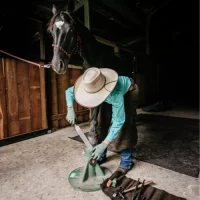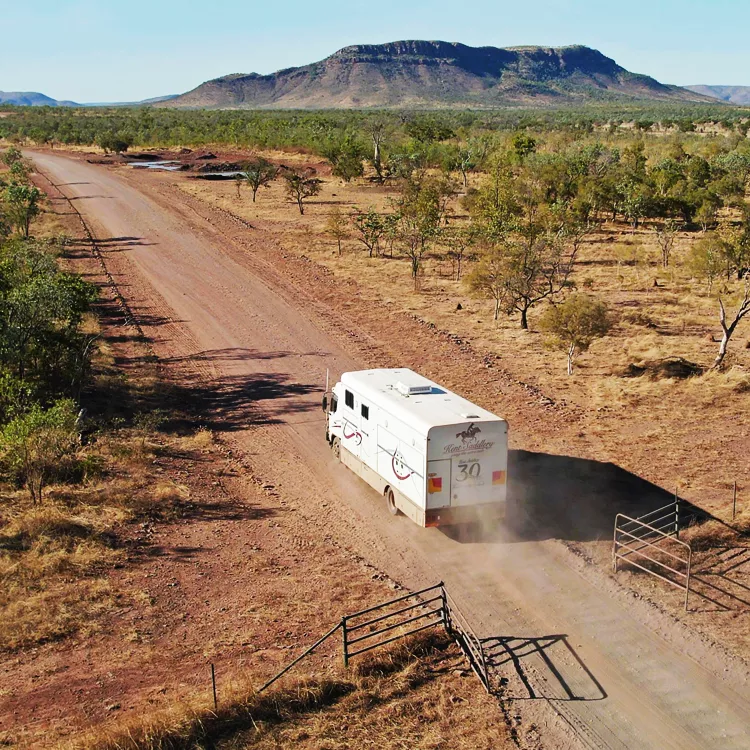Keeroongooloo Station, Windorah, Channel Country, Qld
David and Megan Cross
“Loving Living Out West”
You need to have been born and bred around Windorah, or at least lived in the area for a good many years, to be able to say Keeroongooloo with the correct pronunciation and enunciation. It’s not Keer-oon-goo-loo, or even Ka-rong-ga-loo, its more like Ka-rong-la, or Karongala, or something like that! If the truth be known, there’s a unique Channel country way of talking, and according to David Cross “outsiders just can’t comprehend it; can’t work it out,” so it’s probably best to leave the pronunciation of the station name to the locals.
David Cross, better known as ‘Crossy,’ was born in Toowoomba in 1966, and grew up on his parents’ property near Windorah. He’s definitely regarded as a local, and can talk with authority about the 581,426 ha property, which he manages for The Georgina Pastoral Company.
His wife Megan, is an “import”; born in Atherton, Nth Qld, and reared on a farm on the Atherton Tablelands. However, when she completed nursing training, she followed a dream to go out West, and in 1989, she nursed at Aramac and Barcaldine, (near Longreach QLD) and met David at a shearers ball, in Aramac. It seems that they had a ….great time at the shearers ball, and other social events that followed! Megan laughs ‘We used to have a few parties together!’
As a kid, Crossy would head “straight out to camp” in the school holidays…. all the kids went. They used to get a lot of work done with us kids. You had to do all your own stuff… break in your own horse.. I got a lot of experience.” Most of that experience was gained at Morney Plains Station with his uncle, Geoff Schrader, and following three years schooling in Longreach, Crossy enrolled at Longreach Pastoral College in 1982, 83. “I enjoyed it… there was a bit of mucking around, but yeah it was a good thing to do.”
After Longreach, it was straight back into the stock camp for Crossy; at Sandringham Station, then South Galway Station, where he ran the camp for a while. Crossy describes how he and Megan were “married in December 1992… and then I went flying!” He trained for his helicopter licence in 1993, and then began to work independently as a mustering pilot.
The couple began married life in a house in Windorah, and during this time their daughters, Teressa 1994, and Christina 1996, were born. Crossy was away a lot, and Megan and the girls weren’t seeing much of him. He reflects that “it’s a young person’s game. I planned to do it for a while; do a few miles, but it just never ended!” On September 11, 2002, “in a roaring drought,” Daniel Cross was born, and another little son and brother, Toby arrived in 2005. The opportunity to come to Keeroongooloo was a turning point for the family, and they moved to the station in 2007. Four years on, their satisfaction with and enjoyment of life at Keeroongooloo is obvious. “I love it, I love living out West,” Megan enthuses, “We’re both together, and it’s good for the boys with their Dad around. It’s a lot better.”
Crossy enjoys it “as much as the day I left school. Georgina Pastoral are good to work for; a real good company. They look after everything.” The couple appreciate the country of Keeroongooloo for a number of reasons. In 2011, the previous drought had been broken by excellent rains, and with such favourable conditions, David was looking forward to seeing fresh growth of grasses and plants. Keeroongooloo is a bullock depot, and while David admits that “you’ve got to find fellas who want to do work with bullocks, he’s pleased that the work is as diverse as the country.
A lot of the station is crisscrossed by channels, and the benefit comes when the floodwaters of the Barcoo River spread over the flood out country, bringing the moisture for the growth of much needed herbage.
Megan sees the country of Keeroongooloo as “quite beautiful; even the hard, hilly country out the back.” She’d recently discovered some delicate ferns growing among the mulga; amazed that the spores must have been lying dormant, all through the dry.
For the Crosses, one of the biggest challenges in coming to Keeroongooloo has been “learning to be the bosses.” It was a steep learning curve, but they’re now comfortable in their roles, and appreciate “a good sized staff.” They’ve benefited from the loyalty of workers who’ve “returned for another round,” and fresh new staff add to the interest, and challenge of coordinating a team which works together to get the job done.
One day, one young ringer, “from the coast’ was party to Crossy giving another more experienced worker ‘a serve’ when they were out chasing old bullocks. Crossy was yelling, ‘Get up on ‘ím, get up on ‘ím! (meaning “get your horse up close to the bullock!”) The young fella, keen as mustard to have a go, had heard, but not seen what Crossy meant, and Crossy emphasises, “he didn’t ask!” Ignorance was certainly not bliss, and the next minute, the ill-informed young man “raced that old horse up to the bull, and then leapt off that horse onto that bull, flat stick! “Get up on ‘ím….! ”that’s what he thought it meant!” So much for one young man’s first bull ride!
Megan affirms that “it’s a great life for the kids,” and when Teressa and Christina come home from high school in the holidays, the whole family have an opportunity to participate in whatever is happening around the station. Megan laughs and says “The girls have lots of good stories to take back to school.” At the station complex, the Crosses live in a lowset conventional home, and close to the station kitchen, the highset historical homestead, used for a guest house, creates an atmosphere of remembrance of days gone by.
In the 1960’s and 70’s, some of the existing buildings at Keeroongooloo were shifted from “Yeppara,” a sheep station which had closed down, and there are accounts of the old outstation of “ Canoon”, where the men camped out for months on end; bronco branding, and living in very isolated conditions. (Merv Wortley Senior, currently living at Ruby Plains Station, Kimberly WA, worked on Keeroongooloo in the 1950’s and 60’s and his story is on the Kent Saddlery Website, 2008 Catalogue stories.)
Having lived in, and relying on their local service town of Windorah, David and Megan voice their concern for the demise of little country towns like Windorah. These community towns, which represent the ‘life’ of Outback areas, are getting quieter, and local workers are leaving, attracted by the ‘bigger money’ offered by mining companies. Crossy sees it as a “money verses lifestyle” issue, and is convinced that work satisfaction and the fun and excitement of stock work, will always be a major draw card for young people looking for employment. He states, “I can’t see some fellas in any other job.”
Speaking as a stockman, and from his long experience as a mustering chopper pilot, he advocates the advantages for aspiring young pilots to “do the ground work first. It’s a foundation; the miles on the ground make a lot of difference.” Crossy is also aware of the enormous costs involved with chopper pilot training. “It’s out of the reach of a lot of the young ones who are dead keen to get their licence.”
It seems important that, if these young ones look to Crossy as a model, they’ll maybe realize their dreams if they “hang in there.”
David and Megan are reaping the rewards of working hard, and being prepared to wait. They’ve established an accepting and encouraging environment for the staff at Keeroongooloo, and Crossy is willing and able to provide hands-on training for those interested in the industry. He and Megan are satisfied with and stimulated by life at Keeroongooloo. They’re as comfortable being at the station as they are with pronouncing its name properly, and Crossy indicates his commitment with a grin. “I don’t see the need to do anything else. I don’t feel like doing anything else. I reckon it’s a good life.”















